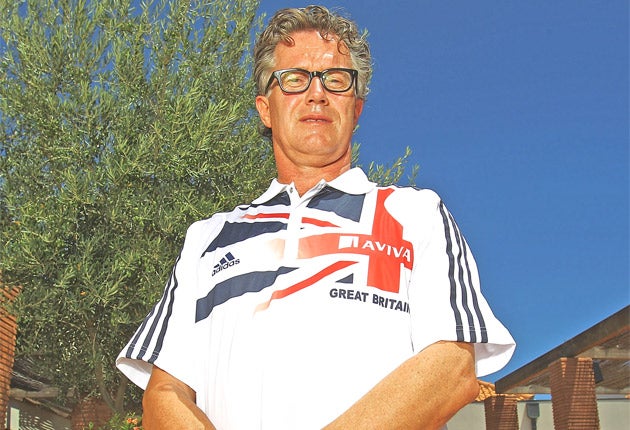Van Commenee accuses his British athletes of 'underperforming'

Your support helps us to tell the story
From reproductive rights to climate change to Big Tech, The Independent is on the ground when the story is developing. Whether it's investigating the financials of Elon Musk's pro-Trump PAC or producing our latest documentary, 'The A Word', which shines a light on the American women fighting for reproductive rights, we know how important it is to parse out the facts from the messaging.
At such a critical moment in US history, we need reporters on the ground. Your donation allows us to keep sending journalists to speak to both sides of the story.
The Independent is trusted by Americans across the entire political spectrum. And unlike many other quality news outlets, we choose not to lock Americans out of our reporting and analysis with paywalls. We believe quality journalism should be available to everyone, paid for by those who can afford it.
Your support makes all the difference.A year out from the London Olympics, the message from the man in charge of the British team in the showpiece sport of the Games is typically frank. "We're not ready for the Games now," Charles van Commenee, the head coach of the British athletics team, said yesterday. "We've still got athletes who are underperforming at the moment. We need those 12 months to turn that around."
It is a characteristically forthright assessment of the state of the host nation's running, jumping and throwing talent by the arch-pragmatist Dutchman who was hired in February 2009 to put British athletes on the podium in the main Olympic arena in 2012. It comes just as British track and field is enjoying a timely pre-Olympic year boom.
British athletes top the world rankings in three events: Mo Farah in the 5,000m and 10,000m and Jessica Ennis in the heptathlon. A further two British athletes, triple jumper Phillips Idowu and 400m hurdler Dai Greene, are also genuine gold-medal hopes for the biennial World Championships, which take place in Daegu, South Korea, at the end of next month.
In all, there are Britons in the top six in the world rankings in 10 events. At the end of 2010, they were in the top six in just four. Then there has been the spate of British records this season: eight thus far. It is likely to be the most prolific summer of British record breaking since 1980, the year Steve Ovett, Sebastian Coe and Daley Thompson all struck Olympic gold in Moscow.
And yet Van Commenee remains a far from satisfied man as he works towards his long-term target of eight medals, one of them gold, in 2012. The last British Olympic team to achieve that tally were the class of 1988 and they failed to glean a gold between them in Seoul, despite the presence of such all-time greats as Thompson, Colin Jackson, Steve Cram and Linford Christie.
To have a realistic chance of hitting that target, Van Commenee reckons he needs at least 15 athletes capable of challenging for medals. So has he got those 15 a year out? "If everybody were fit, then yes, but you will never have a situation where everybody is fit," Van Commenee said. "We need a few more. We're not ready to do the Games now. We need those 12 months.
"We're not perfect. We've still got athletes underperforming at the moment. We need those 12 months to turn that around. Let's say if [400m runners] Michael Bingham and Martyn Rooney run the times they've been running this summer again next year, then that's trouble.
"That should not happen. They should have run faster by now, and if we analyse correctly they should be better 12 months from now. We need that time. I knew when I started this job two and a half years ago that we would not have one day too many."
Certainly, the British athletics team could not have one gold-medal contender too many. In 2010, only Ennis topped the world rankings. "It's very important to have winners, because success breeds success," Van Commenee said. "If we have athletes who break personal bests but don't win anything, that's not good. We need winners, and Jessica is one of the very few. Having a winner is one thing. Having two or three is exceptional."
Having athletes of medal-winning potential who can cope with the pressure of a home Olympics will be another vital ingredient come 27 July next year. "The vast majority of the athletes are looking forward to it," Van Commenee said. "There may be a few who see it as a threat but that's a very few. We have to help them turn that around and embrace it.
"One of the things in the psyche of an athlete is to turn negatives into positives. I remember when I used to coach Denise Lewis she always feared the 800m and after a couple of years she was actually looking forward to it. The theme was to embrace the 800m."
After embracing the 800m – the final event of the heptathlon in Sydney in 2000 – Lewis had what her coach is craving again for 2012: British Olympic gold.
Best of British: where in the world?
Ranked first:
Mo Farah, 5,000m
Mo Farah, 10,000m
Jessica Ennis, Heptathlon
Ranked fourth:
Phillips Idowu, Triple jump
Lawrence Okoye, Discus
Holly Bleasdale, Pole vault
Ranked fifth:
Chris Tomlinson, Long jump
Tiffany Ofili-Porter, 100m hurdles
Ranked sixth:
Dai Greene, 400m hurdles
Goldie Sayers, Javelin
Join our commenting forum
Join thought-provoking conversations, follow other Independent readers and see their replies
Comments